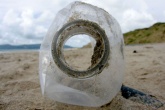Great British Beach Clean 2016: We will fight marine pollution on the beaches

As part of the nationwide beach clean, litter-pickers will not only provide the nation’s coastline with a much-needed facelift, but also contribute their findings to a global beach clean count, which provides important data on the pressing issue of plastic pollution.
Beach clean events are taking place all over the UK (and can be found listed on the Marine Conservation Society’s website), and there is still time to register to join the clean-up of the UK’s beaches and prevent coastal litter polluting the seas.
“Beach litter has steadily risen over the two decades we’ve been recording it on UK beaches,” says MCS Beachwatch Manager, Lauren Eyles. “It is a serious environmental problem, but the solution is in our hands. We want the ‘Great British Beach Clean’ weekend to offer a snapshot of what the future could look like for the British seaside by reducing the amount of litter that reaches our shores.”

MCS says cleaning and surveying a beach only takes a couple of hours at most. Each beach has a coordinator, who explains how to fill in a simple data form, and then it’s just a case of grabbing a litter picker and a bin bag and filling it up with rubbish.
Volunteers are also asked to record any branded items they find, to enable MCS to approach specific manufacturers and retailers and look at ways they can work with them to reduce the amount of rubbish from their products reaching our beaches.
The devastating effect of plastic pollution
The presence of plastic in the marine environment has a devastating effect on the wildlife it houses, which has become all too evident in recent times – earlier this year, for instance, 13 sperm whales beached themselves on Germany’s North Sea Shore, each containing pieces of plastic in their stomachs and intestines.

Furthermore, Eunomia also claims that an average of less than one kilogramme (kg) of plastic can be found in each square kilometre (km) of the ocean’s surface – where previous efforts have been focused – equating to less than one per cent of marine plastics. The study suggests that the amount of plastic existing on beaches is five times greater, and comes at the much higher concentration of 2,000kg/km2.
The consultancy has called for a shift in focus in the fight against plastic pollution from the surface of the sea itself to the beaches which border it, where litter is much more easily accessible and can therefore be treated more effectively.
Last year, the International Coastal Cleanup, of which the GBBC is part, saw more than 8,000 tonnes of rubbish were collected from the world’s beaches by nearly 800,000 volunteers. As part of that, the 2015 Great British Beach Clean involved 6,035 volunteers, the highest number in the event’s 22-year history. Unfortunately, the figure of 3,298 pieces of litter picked up per kilometre surveyed was also the highest yet, and evidence that we need to keep taking the fight to the beaches.
More information about events and how to register are available at the Marine Conservation Society’s website.









